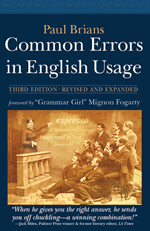In old English ballads, it is common to follow the name of someone with a pronoun referring to the same person. For instance: “Sweet William, he died the morrow.” The extra syllable “he” helps fill out the rhythm of the line.
Though this pattern is rare in written prose it is fairly common in speech. If you say things like “Nancy, she writes for the local paper” people are less likely to think your speech poetic than they are to think you’ve made a verbal stumble. Leave out the “she.”
The same pattern applies to common nouns followed by pronouns as in “the cops, they’ve set up a speed trap” (should be “the cops have set up a speed trap”).
BUY THE BOOK!
